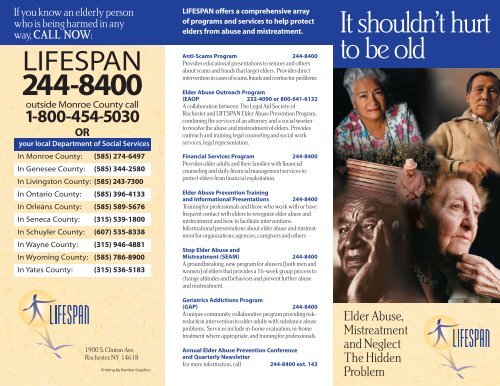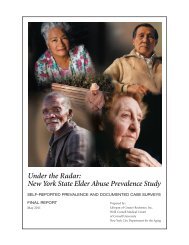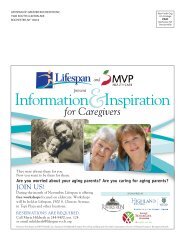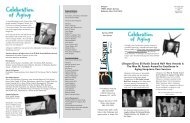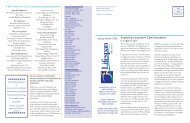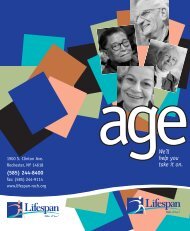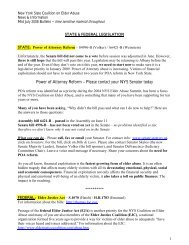Elder Abuse brochure 2003 - Lifespan
Elder Abuse brochure 2003 - Lifespan
Elder Abuse brochure 2003 - Lifespan
Create successful ePaper yourself
Turn your PDF publications into a flip-book with our unique Google optimized e-Paper software.
If you know an elderly person<br />
who is being harmed in any<br />
way, CALL NOW:<br />
LIFESPAN<br />
244-8400<br />
outside Monroe County call<br />
1-800-454-5030<br />
OR<br />
your local Department of Social Services<br />
In Monroe County: (585) 274-6497<br />
In Genesee County: (585) 344-2580<br />
In Livingston County: (585) 243-7300<br />
In Ontario County: (585) 396-4133<br />
In Orleans County: (585) 589-5676<br />
In Seneca County: (315) 539-1800<br />
In Schuyler County: (607) 535-8338<br />
In Wayne County: (315) 946-4881<br />
In Wyoming County: (585) 786-8900<br />
In Yates County: (315) 536-5183<br />
1900 S. Clinton Ave.<br />
Rochester, NY 14618<br />
Printing by Panther Graphics<br />
LIFESPAN offers a comprehensive array<br />
of programs and services to help protect<br />
elders from abuse and mistreatment.<br />
Anti-Scams Program 244-8400<br />
Provides educational presentations to seniors and others<br />
about scams and frauds that target elders. Provides direct<br />
intervention in cases of scams, frauds and contractor problems.<br />
<strong>Elder</strong> <strong>Abuse</strong> Outreach Program<br />
(EAOP) 232-4090 or 800-641-6132<br />
A collaboration between The Legal Aid Society of<br />
Rochester and LIFESPAN <strong>Elder</strong> <strong>Abuse</strong> Prevention Program,<br />
combining the services of an attorney and a social worker<br />
to resolve the abuse and mistreatment of elders. Provides<br />
outreach and training, legal counseling and social work<br />
services, legal representation.<br />
Financial Services Program 244-8400<br />
Provides older adults and their families with financial<br />
counseling and daily financial management services to<br />
protect elders from financial exploitation.<br />
<strong>Elder</strong> <strong>Abuse</strong> Prevention Training<br />
and Informational Presentations 244-8400<br />
Training for professionals and those who work with or have<br />
frequent contact with elders to recognize elder abuse and<br />
mistreatment and how to facilitate interventions.<br />
Informational presentations about elder abuse and mistreatment<br />
for organizations, agencies, caregivers and others<br />
Stop <strong>Elder</strong> <strong>Abuse</strong> and<br />
Mistreatment (SEAM) 244-8400<br />
A groundbreaking, new program for abusers (both men and<br />
women) of elders that provides a 16-week group process to<br />
change attitudes and behaviors and prevent further abuse<br />
and mistreatment.<br />
Geriatrics Addictions Program<br />
(GAP) 244-8400<br />
A unique community collaborative program providing riskreduction<br />
intervention to older adults with substance abuse<br />
problems. Services include in-home evaluation, in-home<br />
treatment where appropriate, and training for professionals.<br />
Annual <strong>Elder</strong> <strong>Abuse</strong> Prevention Conference<br />
and Quarterly Newsletter<br />
For more information, call 244-8400 ext. 143<br />
It shouldn’t hurt<br />
to be old<br />
<strong>Elder</strong> <strong>Abuse</strong>,<br />
Mistreatment<br />
and Neglect<br />
The Hidden<br />
Problem
No one talks much<br />
about elder abuse.<br />
Caring people can help stop elder abuse and<br />
mistreatment in their families and community.<br />
Not the victims who are too frightened,<br />
too ashamed or too sick to tell someone<br />
Not the neighbors who may not<br />
recognize the problem or don’t know who to tell<br />
And not the perpetrators.<br />
<strong>Elder</strong> abuse is hidden. It is a crime<br />
that thrives on silence. <strong>Elder</strong> abuse exists in<br />
every community and every neighborhood,<br />
rich and poor, even in “nice” families. Adult<br />
children and grandchildren are often abusers.<br />
Sometimes it’s an acquaintance or caregiver.<br />
If you know an elderly person who is being<br />
harmed in any way, either by the actions<br />
of other people or through self-neglect,<br />
CALL LIFESPAN<br />
244-8400<br />
or outside Monroe County call<br />
1-800-454-5030<br />
or Protective Services for Adults in your local<br />
Department of Social Services.<br />
Shining Light on the<br />
Hidden Problem of<br />
<strong>Elder</strong> <strong>Abuse</strong><br />
<strong>Elder</strong> <strong>Abuse</strong> Is:<br />
■ Pushing, hitting, punching.<br />
■ Shouting at, berating, intimidating,<br />
threatening to harm an elderly person.<br />
■ Taking financial advantage of one who is<br />
lonely, vulnerable or has memory lapses.<br />
■ Taking money an elderly person needs,<br />
“borrowing” money with no intention to<br />
pay it back, tricking someone to buy<br />
something they have no use for.<br />
■ Neglecting an elderly person’s physical,<br />
medical and emotional needs.<br />
■ Allowing an older adult to neglect their<br />
personal needs.<br />
What to Look for:<br />
■ Unexplained injuries, bruises, burns.<br />
■ Excessive fears, withdrawal, agitation.<br />
■ Sudden inability to pay bills, buy food or<br />
personal items.<br />
■ Changes in appetite; unusual weight gain<br />
or loss.<br />
■ Poor personal hygiene.<br />
■ Does not know personal finances.<br />
■ Unexplained changes in health.<br />
DO’s for families and friends:<br />
■ Respect and honor our elders<br />
■ Report suspected abuse/mistreatment or<br />
self-neglect<br />
■ Find sources of help and use them<br />
■ Visit regularly; monitor the well being of<br />
elderly neighbors<br />
■ Keep track of medicines and doctors’ visits<br />
■ Volunteer to help<br />
■ Realize abuse can happen in your family<br />
or neighborhood<br />
■ Speak up when something looks or<br />
sounds wrong<br />
DON’Ts for older adults<br />
■ Don’t live with a person who has a background<br />
of violent behavior or alcohol or drug abuse<br />
■ Don’t hesitate to tell others if you are abused,<br />
mistreated, neglected — your doctor, the<br />
clergy, a friend or family member<br />
■ Don’t leave cash or valuables lying around<br />
■ Don’t give friends or family money you<br />
need to live on<br />
■ Don’t sign a document unless someone you<br />
trust reads it<br />
■ Don’t allow anyone to keep details of your<br />
finances or property from you


